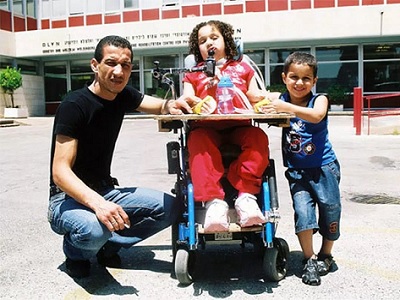
By Ramona Wadi
In 2006 the Israeli assassination of Islamic Jihad leader Muhammad Dahdouh while he was driving through Gaza City also killed and injured other civilians. Maria Aman, who was travelling with her family when the missile struck Dahdouh’s car, was left paralyzed, while four of her family members were also killed.
There was much attention on her case when Israeli authorities attempted to terminate her treatment and revoke her temporary residence status which allowed her to receive treatment in Israel. In October 2016 Maria was granted permanent residency, while her father and brother – who are also her only carers – have to renew their temporary residence status each year.
The Times of Israel has published an interview with Maria’s father, Hamdi, framing her presence in Israel as a symbol of Israel’s benevolence. If targeted assassinations were not an Israeli policy, Maria might have escaped paralysis and her family members would still be alive; that is, if they had also managed to evade being murdered or injured during Israel’s massacres on the enclave.
What is most evident in the report, however, is the exploitation of needs and fear. Statements have been attributed to Maria such as: “She’s not angry about being paralysed. ‘I got used to it,’ she says with a smile.”
It is easy to see how such statements, if true, are projections of fear. Within a wider framework it highlights the fragmentation of Palestinians as a direct result of the situations inflicted upon them by Israel. Had Maria remained in Gaza she would not have had access to the necessary treatment. But as a result, staying in Israel for medical treatment has had repercussions on Maria’s family whose residency status is still subject to manipulation by Israel – revoking the permits is a simple matter for the authorities.
Israeli spokesperson for the Population and Immigration Authority Sabin Hadad attempts to evoke similarities between Maria’s case and those of Palestinians who collaborate with Israel: “Who else besides a collaborator gets to stay in Israel? Gets a place to live? A car?”
The fine line between appeasement and fear is what Israel seeks to maintain. Given the vast experiences of Palestinians as a result of Israeli colonial violence, it is becoming even more difficult for each unique situation to generate enough social support.
On the surface, there are violations which – owing to their frequency – have been categorized as collective experiences. Palestinian prisoners, home demolitions, forced displacement, incarceration of Palestinian minors and torture are a few of these instances. Yet within these categories the individual Palestinian experience is not only lost but it is fraught with complications. It forces reactions bordering on the absurd which can only be understood within the context of that particular suffering.
At every opportunity Israel exploits Palestinians and then blames them for being fragmented. It is not without reason that patronizing statements have been quoted in the context of Maria’s situation. The chilling aspect, however, is that no amount of statements which demonstrate assimilation – imaginary or otherwise – will influence or detract from Israel’s power to use families as pawns. The luxury of choosing is not available to Palestinians.
– Ramona Wadi is a staff writer for Middle East Monitor (MEMO) where this article was originally published.




